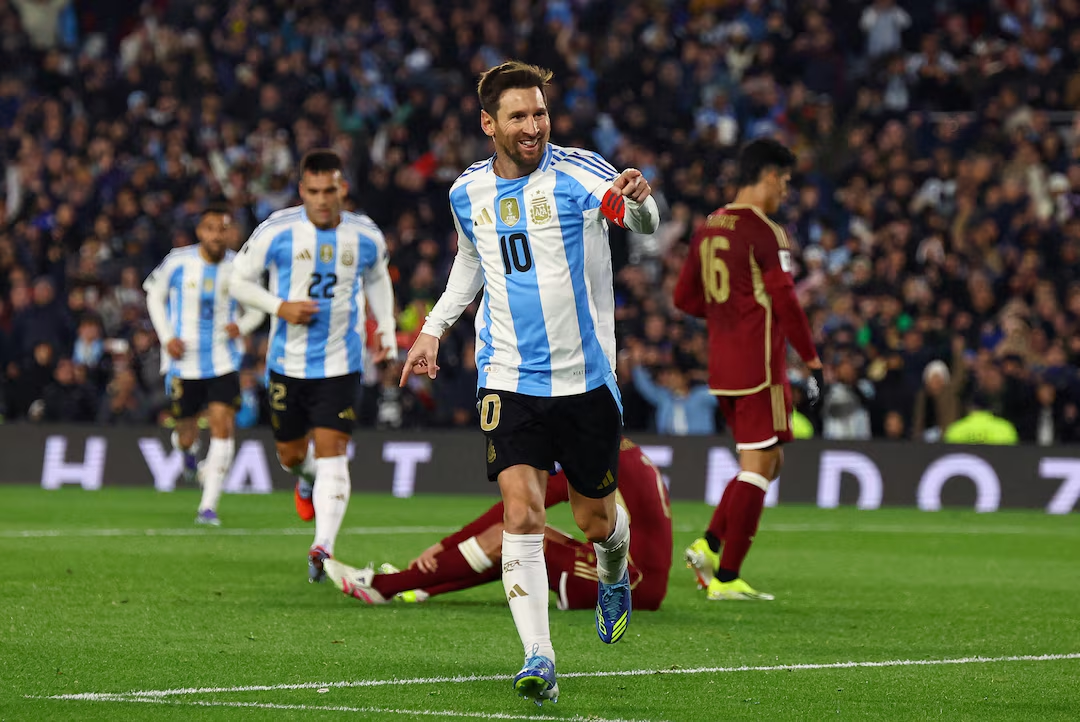
In a night drenched in emotion and history, Lionel Messi delivered a performance befitting his legendary status, scoring twice in what is widely believed to be his final competitive home game for Argentina. The 38-year-old maestro led his nation to a commanding 3–0 victory over Venezuela in the FIFA World Cup qualifier at Estadio Monumental, Buenos Aires. With Argentina already qualified for the 2026 tournament, the match was less about points and more about legacy, gratitude, and the celebration of a career that has defined an era.
From the moment Messi stepped onto the pitch, the atmosphere was electric. Fans packed the stadium, waving flags, chanting his name, and holding banners that read “Gracias, Leo.” The pre-match warm-up itself was a spectacle, with Messi visibly moved to tears as he soaked in the love from the crowd. It was a moment that transcended sport—a nation bidding farewell to its greatest ever player on home soil.
A Performance That Defied Age
Despite the emotional weight of the occasion, Messi was all business once the whistle blew. In the 39th minute, he opened the scoring with a moment of pure brilliance. Julian Álvarez threaded a perfectly timed through ball into the box, and Messi, with the calm of a man who has done it a thousand times, chipped the ball over the onrushing goalkeeper. Both the keeper and a defender were left sprawling, helpless against the precision and elegance of the strike.
It was vintage Messi—vision, timing, and execution all rolled into one. The goal sent the crowd into a frenzy, and chants of “Messi, Messi” echoed through the Monumental. But he wasn’t done yet.
In the 80th minute, Thiago Almada delivered a low cross into the box, and Messi, arriving with perfect timing, tapped it in with a first-touch finish. It was a simple goal by his standards, but the significance was immense. The brace not only sealed Argentina’s win but also served as a poetic bookend to his home career in the national jersey.
Between those two goals, Lautaro Martínez had added a second for Argentina in the 76th minute, ensuring the team’s dominance was reflected on the scoreboard. But the night belonged to Messi.
A Career Etched in Argentine Hearts
Messi’s journey with the national team has been one of triumph, heartbreak, redemption, and ultimately, glory. From the early days of criticism for not replicating his club success with Argentina, to lifting the Copa América in 2021 and the World Cup in 2022, his story has mirrored the emotional rollercoaster of an entire nation.
This final home game was not just a farewell—it was a celebration of everything he has given to Argentina. The goals, the assists, the leadership, and most importantly, the hope. For many fans, Messi is more than a footballer; he is a symbol of excellence, humility, and perseverance.
After the match, Messi addressed the crowd and the media, acknowledging the emotional significance of the night. He spoke about the joy of playing in front of his people, the pride of wearing the Argentine jersey, and the uncertainty surrounding his future. While he stopped short of announcing his retirement, he admitted that the 2026 World Cup may be out of reach due to his age, though he remains motivated and excited as the tournament nears.
“I go day by day, match by match,” he said. “When I feel good, I enjoy it. When I don’t, I prefer not to be there. So we’ll see.”
The Monumental Moment
Estadio Monumental has witnessed countless historic matches, but few have carried the emotional weight of this one. The stadium was transformed into a theater of gratitude, with 80,000 fans playing the role of chorus in Messi’s final act. The standing ovation, the tears, the chants—it was a collective expression of love and appreciation.
Messi’s family was present, adding a personal touch to the occasion. His children watched from the stands as their father etched another chapter into football folklore. The moment was intimate yet grand, personal yet universal.
What Comes Next
While Messi’s future with the national team remains uncertain, his impact is indelible. He has inspired a generation of players who now carry the torch—Álvarez, Almada, Martínez, and others who grew up idolizing him. His influence will continue to shape Argentine football long after he hangs up his boots.
At club level, Messi is expected to return to Inter Miami for the remainder of the MLS season. His focus will shift to domestic competitions, but the echoes of his farewell in Buenos Aires will linger. Whether he makes it to the 2026 World Cup or not, his legacy is secure.
For Argentina, the challenge will be to transition gracefully into the post-Messi era. The team is well-stocked with talent, and the culture of excellence he helped build will serve as a foundation. But emotionally, replacing Messi is impossible. He is not just a player—he is a phenomenon.
A Farewell Worthy of a Legend
Messi’s brace in his final home game was more than just two goals—it was a statement. A reminder of his enduring brilliance, his connection with the fans, and his place in the pantheon of football greats. It was a farewell that felt like a celebration, a goodbye that carried the warmth of a lifelong bond.
As the final whistle blew and Messi waved to the crowd, there was a sense of closure. Not the end of a career, but the end of a chapter. One written in goals, trophies, and memories that will live on forever.
In the heart of Buenos Aires, under the floodlights of Estadio Monumental, Lionel Messi gave Argentina one last gift—a performance that captured everything he is and everything he means. And as he walked off the pitch, the world watched, knowing it had just witnessed something truly unforgettable.


Leave a Reply